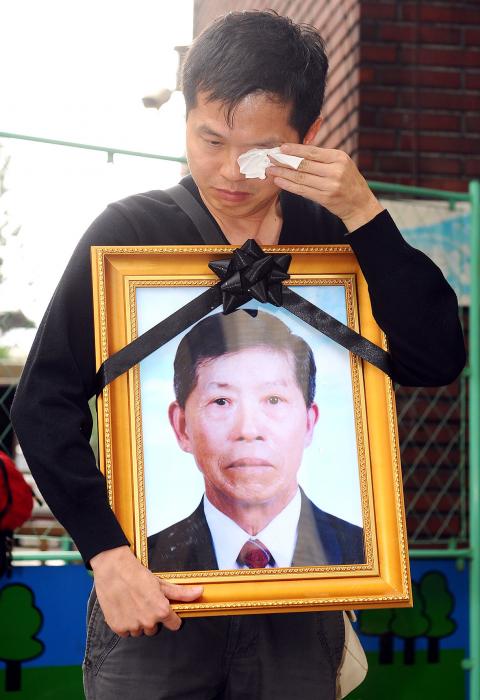The family of an elderly farmer who committed suicide last weekend by consuming herbicide to protest government expropriation of his land on Tuesday publicly denounced the Taoyuan Aerotropolis project and called for an end to forced expropriation of private land.
Lu A-yun (呂阿雲), 83, killed himself by drinking highly toxic herbicide on Saturday. His body was found by relatives when they came home after participating in a protest rally against forced land appropriation for the government-initiated NT$463 billion (US$15.8 billion) aerotropolis project.
The farmer owned property and farmland in Kuolin Village (菓林) in Taoyuan County’s Dayuan Township (大園), close to Taiwan Taoyuan International Airport, the nation’s most important air transport hub.

Photo: Chang Chia-ming, Taipei Times
Carrying a portrait of the deceased farmer, the family went to the Ministry of the Interior’s Construction and Planning Agency building in Taipei on Tuesday to express their grievance, saying that Lu’s death was the direct result of the government project.
“Our family’s property, farmland and our ancestors’ cemetery plots were all expropriated by the government. Our father committed suicide because he felt ashamed toward our ancestors for not being able to protect the family inheritance,” said one of Lu’s sons, Lu Wen-chung (呂文忠).
The core region of the Taoyuan Aerotropolis project covers an area of 6,859 hectares, of which 3,073 hectares needed to be expropriated from private land owners.
Under the project’s construction plan, 31 households in the area would have to make way for a 60m wide access road and a park.
Lu Wen-chung, a professor at the Taipei National University of the Arts, said the family were originally agreeable toward the government’s proposal to exchange the family’s agricultural land for land suitable for construction use.
“However, we never wanted to sell our family land,” he said. “Later we were surprised when the government’s new plan was tabled. In return, our family got our ancestors’ burial plots.”
Lu Wen-chung said his father felt that his whole life’s work had gone up in flames.
“He was distressed that his family had to move to the cemetery plots,” he said.
Wu Chi-ming (吳啟民), head of Taoyuan County’s Urban and Rural Development Bureau, said he regretted what had happened.
He admitted the project’s planning may have some oversights such as the delineation of cemetery plots into residential development zones.
“Future land allocation to original land owners will be done by drawing lots. The Taoyuan Government will also provide its opinions to the Ministry of the Interior to modify certain aspects of the aerotropolis project,” Wu said.
Additional reporting by Cheng Su-ting, staff reporter.

The Mainland Affairs Council (MAC) today condemned the Chinese Communist Party (CCP) after the Czech officials confirmed that Chinese agents had surveilled Vice President Hsiao Bi-khim (蕭美琴) during her visit to Prague in March last year. Czech Military Intelligence director Petr Bartovsky yesterday said that Chinese operatives had attempted to create the conditions to carry out a demonstrative incident involving Hsiao, going as far as to plan a collision with her car. Hsiao was vice president-elect at the time. The MAC said that it has requested an explanation and demanded a public apology from Beijing. The CCP has repeatedly ignored the desires

Many Chinese spouses required to submit proof of having renounced their Chinese household registration have either completed the process or provided affidavits ahead of the June 30 deadline, the Mainland Affairs Council (MAC) said on Thursday. Of the 12,146 people required to submit the proof, 5,534 had done so as of Wednesday, MAC deputy head and spokesperson Liang Wen-chieh (梁文傑) said. Another 2,572 people who met conditions for exemption or deferral from submitting proof of deregistration — such as those with serious illnesses or injuries — have submitted affidavits instead, he said. “As long as individuals are willing to cooperate with the legal

The Ma-anshan Nuclear Power Plant’s license has expired and it cannot simply be restarted, the Executive Yuan said today, ahead of national debates on the nuclear power referendum. The No. 2 reactor at the Ma-anshan Nuclear Power Plant in Pingtung County was disconnected from the nation’s power grid and completely shut down on May 17, the day its license expired. The government would prioritize people’s safety and conduct necessary evaluations and checks if there is a need to extend the service life of the reactor, Executive Yuan spokeswoman Michelle Lee (李慧芝) told a news conference. Lee said that the referendum would read: “Do

Taiwan's Vice President Hsiao Bi-khim (蕭美琴) said Saturday that she would not be intimidated by the Chinese Communist Party (CCP), following reports that Chinese agents planned to ram her car during a visit to the Czech Republic last year. "I had a great visit to Prague & thank the Czech authorities for their hospitality & ensuring my safety," Hsiao said on social media platform X. "The CCP's unlawful activities will NOT intimidate me from voicing Taiwan's interests in the international community," she wrote. Hsiao visited the Czech Republic on March 18 last year as vice president-elect and met with Czech Senate leadership, including